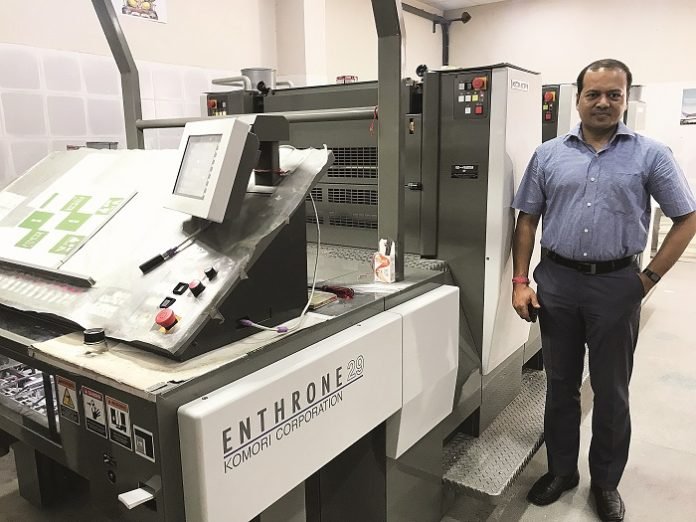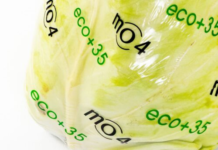 Penguin Packaging in Ludhiana was set up in 1995 with most of the processes being outsourced at the outset. In 1998, the company purchased a single color Dominant offset press and another single color Dominant two years later. After a long gap of 14 years, it installed a double color Dominant. “The reason for the long gap is that I purchased this land in 2003 and it took nearly 4 years to settle our business here. After that, there was a market slowdown and demand fell. We were also involved in another project from 2006 to 2011, which didn’t go as planned and affected our packaging business in a huge way. We witnessed an upsurge in demand in 2012 and that’s when we started our aggressive growth planning. After 2014, demand shot suddenly and we felt the need for a 4-color press. So we eventually purchased a brand new Komori Enthrone 429,” says Vineet Garg, owner of Penguin Packages.
Penguin Packaging in Ludhiana was set up in 1995 with most of the processes being outsourced at the outset. In 1998, the company purchased a single color Dominant offset press and another single color Dominant two years later. After a long gap of 14 years, it installed a double color Dominant. “The reason for the long gap is that I purchased this land in 2003 and it took nearly 4 years to settle our business here. After that, there was a market slowdown and demand fell. We were also involved in another project from 2006 to 2011, which didn’t go as planned and affected our packaging business in a huge way. We witnessed an upsurge in demand in 2012 and that’s when we started our aggressive growth planning. After 2014, demand shot suddenly and we felt the need for a 4-color press. So we eventually purchased a brand new Komori Enthrone 429,” says Vineet Garg, owner of Penguin Packages.
Initial hiccups
“Back in 2017 and before GST, the value-added tax and duties were waived off by customs department under the EPCG scheme. But, after the implementation of GST, the cost of the press shot up by Rs. 40 lakhs. However, since we had already planned to buy the press and it was extremely important to have a 4-color press, we decided to buy it anyhow,” says Garg. The initial payment for Komori was done in October 2017.
After ordering the press, Garg started making more space in his plant for it, which took another four months and delayed installation. The press was installed in June, and running by the first week of July 2018.
Growth in demand

The 4-color press prints 13,000 sheets an hour with makereadies usually taking 12 minutes at Penguin. The company supplies mainly to pharma manufacturers but also to cosmetics and food segments among others. “Most of our customers are smaller players in the industry. We don’t work with major MNCs. That is the reason why our business was affected with the implementation of GST. Smaller players took time to settle with the new regime.
“However, with time we noticed that GST was indeed helpful. The order inflow increased. The billing procedure eased out to a large extent. I think the demand went down initially because companies were not able to understand the regime fully. As far as demonetization, we weren’t affected by it in any manner,” says Garg.
Garg says that his business suffered a bit due to the hiccups faced with the installation of the new press. But with a settled setup now, he is getting new customers and is looking to grow his business. Penguin also makes labels. In a month, the company supplies close to 15 lakh monocartons. It uses a double color press for providing the drip-off effect on the monocartons. Garg says, “In pharma, we have to provide labels along with monocartons. For instance, let’s assume that a company has come up with a new syrup, the artwork is more or less the same for the monocarton and its label. Hence, the customer gets both of them printed from us. But the labels we print are not self-adhesive ones; they’re paper-based wet glue labels. We supply labels only to our carton customers.”
Plans for new Heidelberg CtP and Masterwork die-punching machine
Garg says that with the new Komori 4-color, he feels the need for new and automated ancillary equipment for die-cutting, UV coating, folding-gluing and lamination. Masterwork’s die-cutter sold by Heidelberg India seems attractive to Garg as it supports punching and stripping for 3-ply monocartons or duplex cartons upto 2,000 GSM at an attractive running speed of 7,500 duplex and corrugated sheets an hour. Apart from the postpress, Penguin is planning to bring prepress work in-house with plans to buy a thermal CtP from either Heidelberg or Kodak.
Revoked buyer’s credit adds up to Penguin’s woes
Garg concludes saying that the revocation of the buyer’s credit scheme by the RBI last year is of great concern to his company. “We purchased the Komori machine through buyer’s credit, which entitles you to a waiver of instalments and interest for three years. That was the reason why we opted to go for a Komori in the first place even after knowing that we might not be able to afford it. Had we known earlier, we would have certainly purchased a second-hand Heidelberg press. After the machine reached our unit, we came to know that RBI had ended buyer’s credit. Our loan was converted to Indian Rupees and we incurred a loss of Rs. 1 crore. We weren’t supposed to give any instalment for this machine under the scheme, but now we’re paying instalments of close to Rs. 3 lakhs each month for the new press.”











